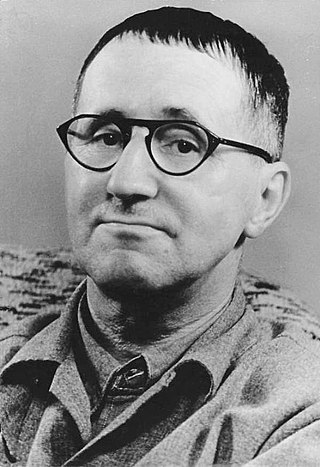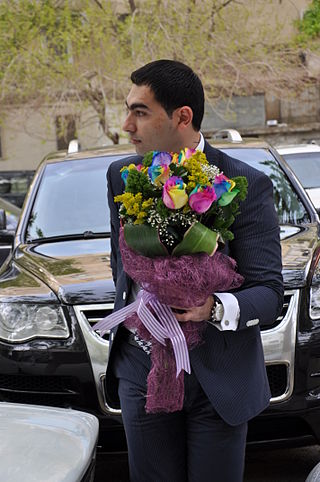
Baal was the first full-length play written by the German modernist playwright Bertolt Brecht. It concerns a wastrel youth who becomes involved in several sexual affairs and at least one murder. It was written in 1918, when Brecht was a 20-year-old student at Munich University, in response to the expressionist drama The Loner by the soon-to-become-Nazi dramatist Hanns Johst.

Drums in the Night is a play by the German playwright Bertolt Brecht. Brecht wrote it between 1919 and 1920, and it received its first theatrical production in 1922. It is in the Expressionist style of Ernst Toller and Georg Kaiser. The play—along with Baal and In the Jungle—won the Kleist Prize for 1922 ; the play was performed all over Germany as a result. Brecht later claimed that he had only written it as a source of income.
The Elephant Calf, also known as The Baby Elephant, is an early one-act surrealistic prose farce written by the German modernist playwright Bertolt Brecht. It originally formed the penultimate scene of Brecht's full-length play Man Equals Man, but by 1926 Brecht had separated it to an appendix to the published text. It was performed as part of Man Equals Man that same year. It is an interlude form of play within a play and in a later note Brecht suggests that it is "to be played in the foyer". He has also given it the subtitle "or The provability of any and every contention".
The Lehrstücke are a radical and experimental form of modernist theatre developed by Bertolt Brecht and his collaborators from the 1920s to the late 1930s. The Lehrstücke stem from Brecht's epic theatre techniques but as a core principle explore the possibilities of learning through acting, playing roles, adopting postures and attitudes etc. and hence no longer divide between actors and audience. Brecht himself translated the term as learning-play, emphasizing the aspect of learning through participation, whereas the German term could be understood as teaching-play. Reiner Steinweg goes so far as to suggest adopting a term coined by the Brazilian avant garde theatre director Zé Celso, Theatre of Discovery, as being even clearer.
The Messingkauf Dialogues is an incomplete theoretical work by the twentieth-century German theatre practitioner Bertolt Brecht. John Willett translates "Der Messingkauf" as "Buying Brass". According to one Brecht scholar "Brecht worked on [the Messingkauf] primarily during the late 1930s and early 1940s. In Brecht’s words it contains, “a lot of theory in dialog form.”"
Mr Puntila and His Man Matti is an epic comedy by the German modernist playwright Bertolt Brecht. It was written in 1940 and first performed in 1948.
Señora Carrar's Rifles is a one-act play by the twentieth-century German dramatist Bertolt Brecht, written in collaboration with Margarete Steffin. It is a modern version of the Irish dramatist John Millington Synge's play Riders to the Sea (1904). The play's setting is re-located to Spain during the height of the Civil War. Teresa Carrar, the mother, wants to protect her children but ends up fighting on the side of the oppressed. Brecht wrote it in 1937 and it received its first theatrical production in the same year, opening in Paris on 16 October. This production was directed by Slatan Dudow and Helene Weigel played Señora Carrar.
The Visions of Simone Machard is a play by the German modernist playwright Bertolt Brecht. Written in 1942, the play is the second of three treatments of the Joan of Arc story that Brecht created. The play was jointly written with Lion Feuchtwanger and was completed during their exile in Los Angeles. Set in France in 1940, it portrays Joan as the patron saint of the resistance movement against the Germans. It was first staged in Frankfurt am Main, in 1957.
Trumpets and Drums is an adaptation of an 18th-century English Restoration comedy by Farquhar, The Recruiting Officer. It was written by the German dramatist Bertolt Brecht in collaboration with Benno Besson and Elisabeth Hauptmann.
Coriolanus is an unfinished German adaptation by the modernist playwright Bertolt Brecht of the English 17th-century tragedy of the same name by William Shakespeare. Brecht wrote it sometime between 1951 and 1953. This adaptation reveals the influence of Mao Zedong on Brecht's social thought especially the idea of primary and secondary contradictions which Mao discussed in his treatise On Contradiction. Brecht alluded to this text and discusses his development on the original and his ideas for its staging in an essay entitled "Study of the First Scene of Shakespeare's Coriolanus", which is written in the form of a dialogue with his collaborators at the Berliner Ensemble theatre company. The play was first staged by Heinrich Koch at the Frankfurt Schauspielhaus theatre, where it opened on 22 September 1962. It was later staged by the Berliner Ensemble in September 1964. Ruth Berghaus became famous for her staging of the battle scenes in this production. The play was published in an English translation by Ralph Manheim in volume nine of Brecht's Collected Plays.
The Trial of Joan of Arc at Rouen, 1431 is an adaptation by the German dramatist Bertolt Brecht of a radio play by Anna Seghers. It was written in collaboration with Benno Besson and premiered at the Berliner Ensemble in November 1952, in a production directed by Besson, with Käthe Reichel as Joan.
Don Juan is an adaptation by the twentieth-century German dramatist Bertolt Brecht of the 17th century French play Dom Juan by Molière. It was the first performance of the Berliner Ensemble after its move to Theater am Schiffbauerdamm, in 1954.
Arnolt Bronnen was an Austrian playwright and director.
The Good Person of Szechwan is a play written by the German dramatist Bertolt Brecht, in collaboration with Margarete Steffin and Ruth Berlau. The play was begun in 1938 but not completed until 1941, while the author was in exile in the United States. It was first performed in 1943 at the Zürich Schauspielhaus in Switzerland, with a musical score and songs by Swiss composer Huldreich Georg Früh. Today, Paul Dessau's composition of the songs from 1947 to 1948, also authorized by Brecht, is the better-known version. The play is an example of Brecht's "non-Aristotelian drama", a dramatic form intended to be staged with the methods of epic theatre. The play is a parable set in the Chinese "city of Sichuan".

Eugen Berthold Friedrich Brecht, known professionally as Bertolt Brecht, was a German theatre practitioner, playwright, and poet. Coming of age during the Weimar Republic, he had his first successes as a playwright in Munich and moved to Berlin in 1924, where he wrote The Threepenny Opera with Kurt Weill and began a life-long collaboration with the composer Hanns Eisler. Immersed in Marxist thought during this period, he wrote didactic Lehrstücke and became a leading theoretician of epic theatre and the Verfremdungseffekt.
Joseph Hill-Gibbins is a British theatre and opera director.

A bridegroom is a man who is about to be married or who is newlywed. In some circles, it is a modern alternative to bride or groom.

Yılmaz Onay was a Turkish author, theatre director and translator.
Bahaghara is a wedding ceremony performed by Odia Hindu people in the Indian state of Odisha. There are subtle differences in the rites observed by different castes. In Odia marriage rituals, the mother of the bridegroom does not take part in the ceremony. The Utkala Brahmins have their weddings only in the daytime, preferably at midday or in the morning, while the other caste weddings are done during the evening or night. There is the custom of sending betel nuts to family friends for inviting them to the marriage. The first invitation is sent to the family deity as a respect to the lord. Marriages in Odisha are mostly fixed and arranged by the parents. Marriages for serving or capturing is not common.
Baal is a 1970 German television film directed by Volker Schlöndorff. It is based on the 1923 play Baal by Bertolt Brecht. The film disappeared after Helene Weigel, Brecht's widow, saw it on television and demanded that it no longer be shown. Ethan Hawke asked Schlöndorff about seeing the film at the Cannes Film Festival, but Schlöndorff replied that he did not know where it was. Eventually the film was discovered in rusty, unmarked cans filed under S. At that point, the film was restored. It was given its first home video release by Criterion in 2018. The film did not make the 1919 play a period piece, and some of the interiors featured intentionally over-the-top colors. It was the first film Dietrich Lohmann shot in color. Margarethe von Trotta was the first actor cast. Fassbinder joined for the title role after Schlöndorff's first choice was unavailable. Much of the supporting cast and crew came from Fassbinder's company, whom he did not want to be put out of work by his absence.




